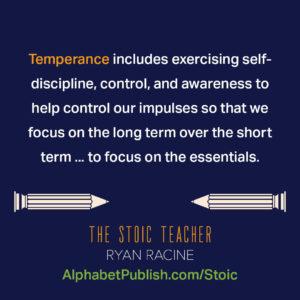When Ryan called me about releasing his book, The Stoic Instructor, I was captivated. I had actually become aware of Stoicism, however I didn’t understand much about it. I constantly associated it with keeping a stiff upper lip, a sort of psychological fatalism. So, I had an interest in checking out Ryan’s book however at the exact same time, a bit hesitant. After all, mentor is generally viewed as a caring occupation, one where we consider the mindsets and inspirations of our trainees all the time. I questioned, “Is Stoicism actually appropriate to mentor?”
As I check out, I discovered myself won over extremely rapidly. I recognized I had a great deal of mistaken beliefs about Stoicism. Ryan’s warm tone and relatable anecdotes revealed me that Stoics are not emotionless robotics. Nor do Stoic worths such as accepting what is beyond your control imply being fatalistic or accepting oppression. I was likewise shocked just how much Stoicism shares with other schools of idea. And while some readers might leap in and welcome Stoicism as a brand-new approach (Chapter 8 has resources for you to do simply that!), it’s simply as simple to take ideas and recommendations in little dosages.
So here are a few of my greatest takeaways from Ryan’s extremely available book. I hope you’ll discover it as handy as I did.
A why for mentor
In the intro, Ryan attends to the very concern I asked myself and you may ask too, “Is Stoicism appropriate to mentor?” His response is that Stoicism can assist notify our factor for being instructors. I do not believe anybody remains in mentor for the cash, status, or power. Most likely, instructors think in assisting others or spreading out understanding or love getting in touch with other individuals. Being clear about your virtues and how they lead you to be an instructor is an actually terrific workout, one that can make you a much better instructor, and definitely a more inspired one! There’s a good little activity in the book to assist you determine your worths and how they link to mentor (Or compose an instructor manifesto, if you choose).
What does that pertain to Stoicism? Well, Stoics thought above all we ought to attempt to be our finest lives.
What does that imply? In part, it implies following a set of strong worths! If we understand what we are leaving our task, we can be much better instructors. And we’ll likewise feel more inspired and satisfied by our task.
The dichotomy of control
This essential Stoic principle appears to state that it is necessary to concentrate on what remains in your control, and attempt not to stress over that which you can not manage. In truth, checking out the very first chapter of The Stoic Instructor, you might discover yourself keeping in mind The Tranquility Prayer:
God, give me the peacefulness to accept the important things I can not alter; the nerve to alter the important things I can; and the knowledge to understand the distinction.

Ryan recommends getting ready for your day by, to name a few things, determining what you will have the ability to manage and what you will not.
You can prepare your lessons, get your products all set, present whatever completely, style interesting and instructional activities and run them perfectly. However at the end of the day, you can not manage whether your trainees discover or not. There are merely a lot of elements beyond your control.
That likewise implies you should not beat yourself up if they do not discover the lesson. That’s a substantial weight off your shoulders, isn’t it? Perhaps there’s even space to be grateful for what worked out in your lesson, instead of focusing completely on the result, which never ever goes precisely as prepared! We are instructors, after all!
Naturally, nobody is stating you ought to rest on your laurels, or neglect it when trainees do not discover. You require to adjust and change and attempt once again the next day. You can’t stop trainees from getting sidetracked, however you can see they are sidetracked and attempt to alleviate those interruptions. Keep in mind, Stoicism does not imply not caring! Or handling a fatalistic mindset of believing you can’t do anything to assist your trainees! Recognizing you can’t manage whatever does not imply quiting! It implies being practical in your expectations on your own!
Stoic Optimism
The subtitle of this book discusses optimism. Yet, the popular conception of Stoics is that they are pessimists. What I have actually concerned understand through reading this book (and this is my casual read, not to be puzzled with any main analysis of Stoic approach and even always what Ryan himself states), is that Stoics are realists. And realism can be a sort of optimism!
As in the example I provided above, if you are practical about setting objectives that you can in fact manage (and Chapter 3 has some excellent recommendations plus an activity to do simply that), then you can attain those objectives and commemorate that. That sounds more positive than beating yourself up due to the fact that something you didn’t have complete control over didn’t take place.

Another example of realism in Stoicism is the view of feelings. Far from believing individuals ought to be emotionless and objectively logical all the time, Stoics acknowledge that feelings are effective and extremely genuine things in our lives!
Nevertheless, that likewise implies confessing that our feelings can get the very best people. We can make choices without believing plainly or misjudge a circumstance due to the fact that we rely excessive on our sensations or our own egos. So due to the fact that we are just human, it’s excellent to make time to be calm and unbiased prior to we make a lot of choices! Ryan has some terrific recommendations on including stillness to our days, even something as basic as taking a short time out in the automobile prior to driving house. (Advises me a little Patrice’s recommendations about discovering a 3rd area, a shift in between work and house).
And if we attempt to make time to believe things through, we can provide ourselves the very best opportunity to make an excellent choice. Which warrants some optimism. In some cases in a tense circumstance, the very best response is no response. Wait till the minute has actually passed and you can relax and take a look at the circumstance reasonably prior to acting. In truth, among my preferred activities in the book has to do with taking a circumstance and assessing your presumptions, which might well be incorrect (See Chapter 3 on reframing a bad day, so that you come out of it with a mindset of thankfulness and wish for the next day). What is more appropriate to an instructor’s life than a method of remaining calm and keeping in control? Thank you, Stoics!
Lest you believe Ryan is being impractical, it deserves keeping in mind that he operates in an alternative-path school. His trainees are frequently in tough individual or house scenarios and have a range of unique requirements. they have actually been not able to prosper in the conventional education system. It’s not the most convenient of mentor scenarios.
Anticipate Issues

Another concept that may trigger individuals to believe Stoics are pessimists is that of premeditatio malorum or ‘premeditation on evils’. You can see why that may sound dismal. However what it actually implies is that we understand bad things will take place. Strategies stop working. Things fail. (In part due to the fact that we can’t manage whatever, it appears to me). These things can be huge or little, and obviously little things can feel huge in the minute.
Rather of pretending we reside in a perfect world, we can steel ourselves for issues. In business world, expecting issues and determining how to conquer them is motivated. I do not believe that sort of preparation is incompatible with Stoicism, however even if you do not make a fallback, the basic mental workout of recognizing things may not go completely is advantageous. It assists you be, attempt I state it, practical.
Naturally, this does not imply you harp on whatever that might fail or presume absolutely nothing excellent will ever take place once again! Ryan prices estimate thinker William Irvine who recommends providing issues a “flickering idea”, no more.
Conclusion
There’s a lot to draw from this book. I have actually actually simply highlighted the concepts that struck me or that I discovered personally helpful in my life. And obviously, these musings might or might not show the author’s intent or real Stoicism. I believe among the pluses of the book is that you do not feel forced to transform to Stoicism. You can take a “mind hack” or 2 or 10. However there are resources for taking a much deeper dive. I’m in fact typing this at an utilized book shop and thinking about seeing if they have Marcus Aurelius’ Meditations on the rack. I likewise especially delight in the conversation concerns at the end of the book and the brief basic activities throughout that assistance you use Stoicism to your life. And the brief essays by other teachers on how they utilize Stoicism in their life!
At the least, I hope I have actually stimulated your interest and shown that Stoicism relates to mentor and instructors!

Source link

